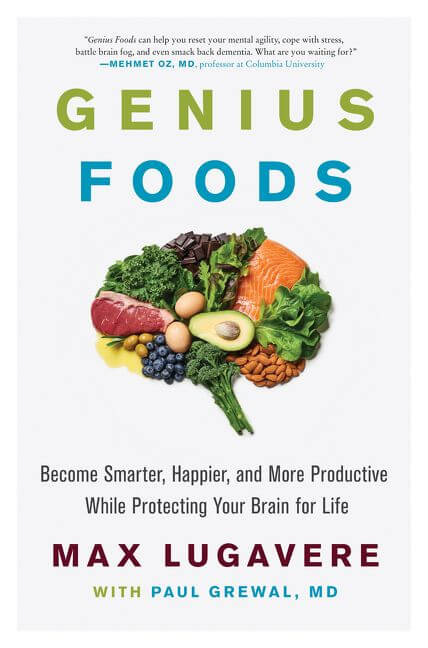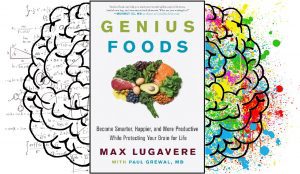Genius Foods looks into the latest research with the aim of optimising brain function and minimising age-related decline. As an avid listener of health podcasts I was impressed to see not only healthy foods covered but research related to heat shock proteins, BDNF, Reactive Oxygen Species and fasting protocols.
While there is nothing ground-breaking in this book, it is a very concise summary of all the latest information on health-promoting foods in a very readable format. There’s a clear lean towards a Ketogenic diet plan and rationing of carbohydrate and sugary foods. Anything you choose to implement from this book is likely to be a step up from your current way of eating and will improve both mental and physical well-being.
Book sixteen is…
Genius Foods by Max Lugavere

PRO TIP: Take notes! When you read a book, use a blank sheet of paper as a bookmark. Write down any interesting facts and information from the book. This condenses a whole book into 3-4 pages of key notes that are important and relevant to you.
My Notes
- To improve your brain you must combat: inflammation, overfeeding, nutrient deficiencies, toxic exposure, chronic stress, physical stagnation and sleep loss.
- Widespread inflammation can eventually damage your DNA, promoted insulin resistance and cause weight gain.
- Lack of variation in temperature we experience on a daily basis may undermine our peak brainpower and resistance to disease.
Genius Food #1 – Extra Virgin Olive Oil (EVOO)*
- Contains oleocanthal which stimulates our bodies repair mechanisms. It’s an anti-inflammatory comparable to a small dose of ibuprofen.
- Increases the activity of enzymes which degrade amyloid plaque (a sticky protein that aggregates to toxic levels in Alzheimer’s disease).
- Protects the brain against decline and is high in mono-unsaturated fat and Vitamin E.
*I don’t feel that sharing all the “Genius Foods” will deter anyone from actually buying the book. They are token selections to illustrate a more general point and all of them are already in books such as The 150 Healthiest Foods On Earth.
- The two most important Omega-3 fats are EPA and DHA, those found in oily fish.
- EPA is anti-inflammatory while DHA is the most important component of healthy brain cells.
- There is also ALA, which needs to be converted to the two aforementioned fats by our body.
- Omega-6 contains Lineloic acid, this is inflammatory and far too prevalent in the Western diet.
- Poly-unsaturated fatty acids (PUFAs) are vulnerable to oxidation, which creates free radicals.
“Free radicals are roughly 10,000x more reactive than other molecules. They attack nearly all other molecules, destroying lipids, proteins, DNA, hormones and enzymes.”
- PUFAs are protected by antioxidants like Vitamin E when eaten in whole foods, but not in heated and chemically processed oils.
- Oxidised oils are found in commercial salad dressings, margarines, cookies, cakes, granola bars, potato chips, pizza, pasta dishes, bread and ice cream. They are in roasted nuts (unless stated as dry-roasted) and coated on breakfast cereals.
- Restaurants will re-use oil which makes it worse, in items like french fries, battered chicken etc. They often contain aldehydes, dangerous compounds found in mutated oils. They are toxic to mitochondria of the brain and spinal cord and directly impairs the cells’ ability to generate energy.
- Oils to watch out for: Canola, Safflower, Corn, Sunflower, Soybean, Rapeseed, Vegetable, Grapeseed, Peanut, Rice bran.
- Following one PUFA rich meal, circulating markers of fat oxidation increase by 50% in young people and up to 1500% in older subjects.
- DHA supports the brain by increasing BDNF. Brain-Derived Neurotrophic Factor promotes creation of new neurons and protects existing brain cells.
- Exercise is the primary way of boosting BDNF, while consuming DHA is the best dietary way.
- It’s better to cook with saturated fat as they are more stable in high heat than EVOO.
- Saturated fat is not inherently healthy or unhealthy, but depends on your diet. It can magnify the deleterious effects of high carbohydrate, low nutrient diets.
- Avoid all “hydrogenated” or “partially hydrogenated” oils.
- Fats facilitate the absorption of Vitamins A, E, D, K & beta carotene. Good sources are found in vegetables and so when eating a salad it’s best to pair with a high fat food such as EVOO.
Genius Foods #2-5 – Avocado, Blueberries, Dark Chocolate (85%+), Eggs
Almost 50% of the population are Magnesium deficient, second only to Vitamin D deficiency in prevalence.
- Glycation occurs when a glucose molecule bonds to a nearby protein or the surface of a cell, causing damage.
- Whether you consume a cup of juice (sharp spike in blood sugar) or bowl of rice (smaller but more prolonged rise in blood sugar), the amount of Glycation is very similar.
- Glycation leads to the formation of Advanced Glycation End-products (AGEs) and gerontotoxins (aging toxins).
- Dry, high-heat methods of cooking like BBQ or roasting are promotive of AGE formation. Processed meats contain higher amount than their natural form. The safest cooking style is to sauté or steam foods.
“The inhibition of fat metabolism by high carb diets may be the most detrimental aspect of modern diets.”
- Insulin interferes with brain processes overnight, you can optimise the critical “brain cleaning” by stopping eating 2-3 hours before bed.
- Adding fat to a carbohydrate-rich meal can reduce the spike but increases amount of insulin released.
“By depriving cholesterol from the brain you directly impact neurotransmitter release.”
- Higher levels of cholesterol, even beyond recommendations, was associated with better cognitive test scores on abstract reasoning, attention and concentration, verbal skills and executive function.
- No need to chase higher intake of cholesterol as the brain produces it. Do avoid cholesterol lowering drugs like statins.
- The average person creates endogenous cholesterol equivalent to four egg yolks per day.
- Extended fasts may negatively affect fertility in women so it’s recommended they start with 12-14 hours.
- Lowering insulin can deplete the body of sodium. During the first week of carbohydrate restriction you might require an additional 2g sodium (5g salt), reduced to 1g sodium after first week.
Genius Foods #6-10 – Grass-Fed Beef, Dark Leafy Greens, Broccoli, Wild Salmon, Almonds
- GABA is the chief inhibitory neurotransmitter in the brain.
- Glutamate is GABA’s precursor and increase overall brain excitation. Involved in learning, memory, creation of new connections between neurons.
- Caffeine increases Glutamate activity and inhibits GABA release.
- Intense exercise can raise resting levels of Glutamate for the following week.
- Meditation, yoga & deep breathing increase GABA.
- Cold showers balance GABA & Glutamate levels.
- Avoid added Glutamate in processed foods, such as MSG in Chinese food and Aspartame in diet drinks.
- Acetylcholine is a neurotransmitter with role in REM sleep, learning, memory. Choline is major dietary precursor to acetylcholine. The best source is eggs.
- Top Choline foods: Beef, Eggs, Shrimp, Chicken, Fish, Broccoli and Spinach.
- Whether you are a “worrier” or “warrior” depends on alleles AA, GG, or AG. The worrier performs poorly under stress and feels higher “highs”, while the warrior is more balanced and better under stress.
- Extreme temperature and exercise can boost Norepinephrine. Norepinephrine is anti-inflammatory and has a role in focus, attention and memory.
- It’s best to eat fewer, large meals to limit Ghrelin (hunger hormone), as frequent small meals is poor advice.
- Re-feeds of 100-150g carbs help balance the LCHF (Low Carb High Fat) diet by boosting Leptin.
- Fasting 14-16+ hrs for a woman and 16-18+ hrs for a man increases Growth Hormone (GH). It is much higher after 24 hours.
- Sauna use can boost GH too. 2 x 20 minutes at 80°C with 30 minute cool off doubled GH. 2 x 15 minutes at 100°C resulted in a five fold increase.
- GH is turned off with carbohydrate consumption.
- Avoid carbohydrates at breakfast. Try to eat proteins and fats instead, though vegetables are fine.
- Eating carbohydrates while stressed promotes visceral fat storage (around organs).
- Hormesis is the mechanism by which small doses of stress, e.g. hard workout, sauna or short term fast, promotes more efficient cells and greater long-term health.
- Aerobic exercise boosts BDNF.
- Anaerobic activity activates AMP kinase, increases fat burning and glucose uptake. It stimulates the creation of more mitochondria (mitochondrial biogenesis).
- Performing brief periods of exercise in either hot or cold temperatures may accelerate the brain benefits of exercise.
At the end of the book the author creates a “Genius Plan”, which is a dietary template incorporating everything mentioned in the book. There are foods to avoid and ones to go out and buy, as well as recipes and meal examples in a “sample week”.
Overall it’s a very nice summary of the research and a useful resource for catching up. It echoes a lot of the research i’ve heard already from people like Dr Rhonda Patrick.

